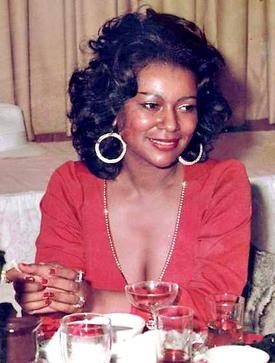Related Research Articles

Rhythm and blues, frequently abbreviated as R&B or R'n'B, is a genre of popular music that originated within the African-American community in the 1940s. The term was originally used by record companies to describe recordings marketed predominantly to African Americans, at a time when "rocking, jazz based music ... [with a] heavy, insistent beat" was starting to become more popular. In the commercial rhythm and blues music typical of the 1950s through the 1970s, the bands usually consisted of a piano, one or two guitars, bass, drums, one or more saxophones, and sometimes background vocalists. R&B lyrical themes often encapsulate the African-American history and experience of pain and the quest for freedom and joy, as well as triumphs and failures in terms of societal racism, oppression, relationships, economics, and aspirations.
Motown is an American record label owned by the Universal Music Group. Founded by Berry Gordy Jr. as Tamla Records on January 12, 1959, it was incorporated as Motown Record Corporation on April 14, 1960. Its name, a portmanteau of motor and town, has become a nickname for Detroit, where the label was originally headquartered.

Sylvia Robinson, known mononymously as Sylvia, was an American singer and record producer. Robinson achieved success as a performer on two R&B chart toppers: as half of Mickey & Sylvia with the 1957 single "Love Is Strange", and her solo record "Pillow Talk" in 1973. She later became known for her work as founder and CEO of the pioneering hip hop label Sugar Hill Records.

Shawntae Harris-Dupart, better known by her stage name Da Brat, is an American rapper. Born and raised in Chicago, she began her career in 1992 and signed with Jermaine Dupri's So So Def Recordings two years later to release her debut studio album, Funkdafied (1994). Receiving platinum certification by the Recording Industry Association of America (RIAA), it became the first album by a female hip hop solo act to do so.
Rare groove is music that is very hard to source or relatively obscure. Rare groove is primarily associated with funk, R&B and jazz funk, but is also connected to subgenres including jazz rock, reggae, Latin jazz, soul, rock music, northern soul, and disco. Vinyl records that fall into this category generally have high re-sale prices. Rare groove records have been sought by not only collectors and lovers of this type of music, but also by hip hop artists and producers.
Uptown Records is an American record label, based in New York City, founded in 1986 by old school rapper ‘Dr Jekyll’ - Andre Harrell. From the late 1980s into the early 1990s, it was a leader in New Jack Swing, R&B, hip hop., and Hip Hop-Soul

Tommy Boy Records is an American independent record label and multimedia brand founded in 1981 by Tom Silverman. The label is credited with helping and launching the music careers of Queen Latifah, Amber, Afrika Bambaataa, Stetsasonic, Digital Underground, Coolio, De La Soul, House of Pain, Naughty By Nature, and Force MDs.

Maurice White was an American musician, best known as the founder, leader, main songwriter and chief producer of the band Earth, Wind & Fire, also serving as the band's co-lead singer with Philip Bailey.
Hip hop soul is a subgenre of contemporary R&B music, most popular during the early and mid 1990s, which fuses R&B or soul singing with hip hop musical production. The subgenre had evolved from a previous R&B subgenre, new jack swing, which had incorporated hip-hop influences into R&B music. By contrast, hip hop soul is, as described in The Encyclopedia of African American Music, "quite literally soul singing over hip hop grooves".

Although the music scene of Atlanta is rich and varied, the city's production of hip-hop music has been especially noteworthy, acclaimed, and commercially successful. In 2009, The New York Times called Atlanta "hip-hop's center of gravity", and the city is home to many famous hip hop, R&B, and neo soul musicians.

Def Jam Recordings is an American multinational record label owned by Universal Music Group. It is based in Manhattan, New York City, specializing predominantly in hip hop, contemporary R&B, soul and pop.

Sylvester Johnson was an American blues and soul singer, musician, songwriter and record producer. His most successful records included "Different Strokes" (1967), "Is It Because I'm Black" (1969) later covered by reggae artists Ken Boothe and Delroy Wilson, and "Take Me to the River" (1975), covered by Al Green and Talking Heads.
Top R&B/Hip-Hop Albums is a music chart published weekly by Billboard magazine that ranks R&B and hip-hop albums based on sales in the United States and is compiled by Luminate. The chart debuted as Hot R&B LPs in the issue dated January 30, 1965, in an effort by the magazine to further expand into the field of rhythm and blues music. It then went through several name changes, being known as Soul LPs in the 1970s and Top Black Albums in the 1980s, before returning to the R&B identification in 1990 and affixing a hip hop designation in 1999 to reflect the latter's growing sales and relationship to R&B during the decade.
Ichiban Records was an American independent record label, founded in 1985 by John Abbey and Nina Easton in Atlanta, Georgia, United States.
Blues & Soul is a British music magazine, established in 1967 by John Abbey. The Independent has noted Blues & Soul as being the equal of magazines such as NME and Q. Billboard magazine has called Blues & Soul "a respected publication."
Christian R&B is a subgenre of rhythm and blues music consisting of tracks with Christian-based lyrics or by musicians typically known for writing such songs. Music in this genre intends to uplift, entertain, or to give a Christian perspective on a topic. Christian R&B could be considered a subgenre of gospel music, or a cross-genre under both gospel and R&B.
Herbert J. Lance was an American jazz, blues and gospel singer, songwriter, record producer, recording studio owner and radio DJ. As well as recording several hits himself in the late 1940s, he co-wrote Ruth Brown's signature song, "Mama, He Treats Your Daughter Mean".
Artie "Blues Boy" White was an American blues and soul singer and guitarist based in Chicago, who was described as "one of the foremost Chicago practitioners of Southern Soul music".
References
- 1 2 John E. Abbey, Blues-I.com, 8 July 1994. Retrieved 14 July 2020
- 1 2 Bob Killbourn, "Picking Up the Reins", Blues & Soul, #1095. Retrieved 13 July 2020
- ↑ Robert Lyons, "Contempo", Record Labels of the 70s. 7tt77.co.uk, Retrieved 14 July 2020
- 1 2 Label Founders Boast Diverse Musical Backgrounds and Teamwork. Vol. 107. Billboard. April 8, 1995. p. 28.
- ↑ "Jet". Johnson Publishing Company. 1 December 1977. Retrieved 17 April 2023– via Google Books.
- ↑ Sarig, Roni (7 September 2007). Third Coast: Outkast, Timbaland, and How Hip-hop Became a Southern Thing. Hachette Books. ISBN 978-0-306-81647-5 . Retrieved 17 April 2023– via Google Books.
- ↑ "Billboard". Nielsen Business Media, Inc. 8 March 1997. Retrieved 17 April 2023– via Google Books.
- ↑ Contact, TheThreeDegrees.com. Retrieved 14 July 2020
- ↑ "Connor Ray Music Label Announces New CEO", Bman's Blues Report, January 20, 2015. Retrieved 14 July 2020